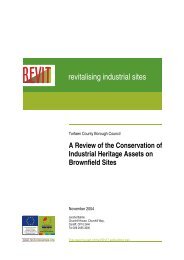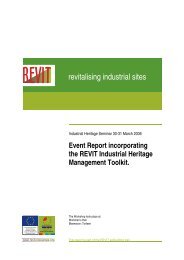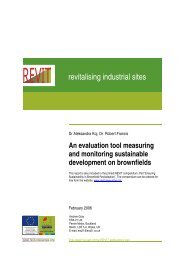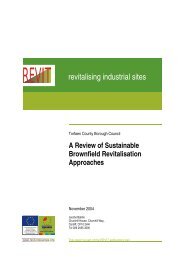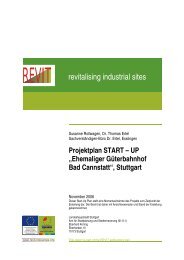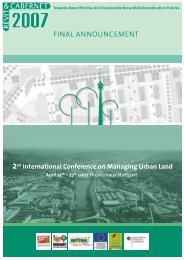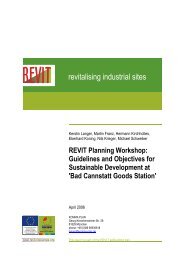DG State Aid – Control and Regeneraton of Deprived Urban ... - REVIT
DG State Aid – Control and Regeneraton of Deprived Urban ... - REVIT
DG State Aid – Control and Regeneraton of Deprived Urban ... - REVIT
Create successful ePaper yourself
Turn your PDF publications into a flip-book with our unique Google optimized e-Paper software.
nature. In these schemes the Commission allows Member <strong>State</strong>s to cover all<br />
additional heritage related costs in regeneration projects by aid.<br />
To promote social integration <strong>and</strong> employment, adequate training is <strong>of</strong> utmost<br />
importance. Commission Regulation (EC) No. 68/2001 on the application <strong>of</strong> Articles<br />
87 <strong>and</strong> 88 <strong>of</strong> the EC Treaty to training aid 28 provides for a block exemption <strong>of</strong> such<br />
aid given to undertakings. This means that training aid, both for general <strong>and</strong> specific<br />
training, which meets the conditions <strong>of</strong> the Regulation, does not need to be notified<br />
to the Commission (subject to the need to submit summary information). Similarly,<br />
Commission Regulation (EC) No. 2204/2002 on the application <strong>of</strong> Articles 87 <strong>and</strong> 88<br />
<strong>of</strong> the EC Treaty to state aid for employment 29 provides for a block exemption for the<br />
creation <strong>of</strong> employment by small <strong>and</strong> medium-sized enterprises (SMEs), <strong>and</strong> by larger<br />
firms in an assisted area within the meaning <strong>of</strong> the regional aid map 2000-2006 (see<br />
below). This means that aid for the creation <strong>of</strong> employment, which meets the<br />
conditions <strong>of</strong> the Regulation, does not need to be notified to the Commission<br />
(subject to the need to submit summary information).<br />
A number <strong>of</strong> aid measures to promote economic activities in deprived urban areas<br />
may also be considered compatible with the common market. This is the case with<br />
aid to small <strong>and</strong> medium-sized enterprises which fulfils the conditions <strong>of</strong> Commission<br />
Regulation 70/2001 for aid to SMEs. Such aid does not have to be notified to the<br />
Commission (again subject to the need to submit summary information). <strong>Aid</strong> for initial<br />
investment carried out by larger companies may also be considered compatible<br />
with the common market, if the investment takes place in an assisted area within the<br />
meaning <strong>of</strong> the regional aid map 2000-2006, the aid respects the limits approved by<br />
the Commission for this period <strong>and</strong> complies with the provisions laid down in the<br />
Guidelines on national regional aid 30 . A number <strong>of</strong> urban regeneration schemes<br />
have been approved upon this basis.<br />
Regarding aid for SMES, the new Commission Regional aid guidelines for the period<br />
2007-2013 31 foresee additional flexibility which will help to tackle the most pressing<br />
needs <strong>of</strong> urban <strong>and</strong> local pockets <strong>of</strong> deprivation, below the NUTS-III level, provided<br />
they have a minimum population <strong>of</strong> 20,000. Regional aid will be allowed in these<br />
areas for SMEs only 32 . In addition, the Guidelines on national regional aid 2007-2013<br />
also introduce a new form <strong>of</strong> aid in order to provide incentives to support business<br />
start-ups <strong>and</strong> the early stage development <strong>of</strong> small enterprises in the assisted areas 33 .<br />
The Commission’s Communication on state aid <strong>and</strong> risk capital 34 sets out the criteria<br />
applied by the Commission to assess the compatibility <strong>of</strong> measures to provide risk<br />
28 OJ L 10, 13.1.2001, p. 20-29, as amended by Commission Regulation (EC) No 363/2004 OJ L 63, 28.2.2004,<br />
p. 20.<br />
29 OJ L 337, 13.12.2002, p. 3-14.<br />
30 OJ C 74, 10.3.1998, p. 9-31, as modified by OJ C 285, 9.9.2000, p. 5.<br />
31 The new Regional aid guidelines 2007-2013 were adopted by the Commission on 21 December 2005. The<br />
provisional text <strong>of</strong> these guidelines can be found at:<br />
http://www.europa.eu.int/comm/competition/state_aid/regional/rag_en.pdf<br />
The final text will be published in the Official Journal <strong>of</strong> the EU after translation into all <strong>of</strong>ficial languages.<br />
32 Pursuant to the new Regional aid guidelines 2007-2013, because <strong>of</strong> the potential distortion <strong>of</strong> competition<br />
resulting from the spill-over effect into the more prosperous surrounding regions, the Commission will not<br />
approve aids for investments by large companies in these areas or aids for investments with eligible expenses<br />
exceeding EUR 25 million.<br />
33 According to the new Regional aid guidelines 2007-2013, this new form <strong>of</strong> aid should be limited to small<br />
enterprises, should be limited in amount <strong>and</strong> degressive <strong>and</strong> shall not be cumulated with other public support<br />
(including de minimis support) in order to circumvent the maximum aid intensities or amounts laid down.<br />
34 OJ C 235, 21.8.2001, p. 3-11.<br />
7



